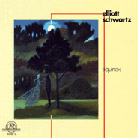March 2001
Equinox collects chamber and orchestral works which require that a committed listener accept a musical vocabulary of jagged melodies and sometimes murky harmonies. Yet, Schwartz's stirring music is also full of emotion and personality that sweep the listener along with them. "Phoenix," written for bassoon and piano, is a good example of Schwartz's eclectic style of chamber music. The composer explains that the piece is about hope, rebirth and flight -- and, in an attempt to evoke the image of the phoenix rising from the ashes, he playfully paraphrases sources as diverse as Stravinsky's Firebird and Jerome Kern's "Smoke Gets In Your Eyes." However, despite Schwartz's whimsical use of sources, this is a serious chamber work. While the bassoon plods along in lengthy and deliberate phrases, the piano alternately whoops, clangs and grumbles. In fact, there are times during the piece when the instruments seem to be playing two different compositions. It is clear that the piano is supplying the color and emotion while the bassoon remains the slow and methodical voice of reason. The technique of borrowing or paraphrasing fragments of well-known pieces can be seen in the swirling musical pastiche entitled "Vienna Dreams." Here several of the great Viennese masters (Mozart, Schubert, Brahms, Mahler and Schoenberg) cast their shadows on the music in one way or another. And in "Rows Garden," tone rows from familiar pieces by Berg, Webern and Schoenberg are treated thematically rather than numerically, as they were in their original 12-tone compositions. Therefore Schwartz feels free to bend and vary them as he sees fit. Both pieces are characteristic of how Schwartz is not bound by a single vocabulary or musical theory. "Tapestry," for violin, cello and piano, is another emotionally charged piece. The work commemorates the courageous efforts of Danes in saving Danish Jews from the Nazis during World War II. Here, Schwartz works with melodic fragments paraphrased or borrowed from Jewish composers who were imprisoned at Theresienstadt, and also draws on a well-known Danish folk song that speaks of innocence and serenity. The wide potential of each instrument creates a stirring statement in which peace and war, innocence and horror, are juxtaposed. The musical vocabulary might be difficult to understand, but the emotions are not. The performances of violinist Renee Jolles, cellist Brent Samuel and pianist Blair McMillen are precise and moving. "Equinox" is the only orchestral composition on this CD. Conductor Roland Kieft leads the JeugdOrkest Nederland through a piece that ranges from serenity to rage. On the surface Schwartz has composed a programmatic work depicting the change of seasons in a single landscape. But his view is not merely of changing colors and of budding, then falling, leaves, but also of emotional as well as physical upheaval. In his lengthy (and well-documented) notes, Marshall Bialosky likens post-modernism to "film music without the film," an unfortunate metaphor that does a disservice to the music presented here. Film music is often about compromises, palatability and subordination to the picture. Elliott Schwartz's music is different a beast entirely. If the music is in some way programmatic (as are the pieces on this CD), historical and descriptive notes should be provided to help the listener better appreciate this collection of work. Saying that there really is a picture but you just can't see it seems to be an attempt to "sell" post-modernism, and that just isn't necessary here. At a time when many pundits are busy writing obituaries for the American post-modern movement, this CD bears witness that it remains a vital and exciting art form worthy of attention and enjoyment. GO BACK TO: |
 Elliott Schwartz - Equinox
Elliott Schwartz - Equinox![[Reviewed on CD]](../format/regcd.gif) Elliott
Schwartz is one of America's most prolific composers in the broad compositional style
known as post-modernism. While he has experimented with synthesizers, tape, jazz and other
trappings of the avant-garde, he has remained committed to composing concert music using
traditional instruments.
Elliott
Schwartz is one of America's most prolific composers in the broad compositional style
known as post-modernism. While he has experimented with synthesizers, tape, jazz and other
trappings of the avant-garde, he has remained committed to composing concert music using
traditional instruments.